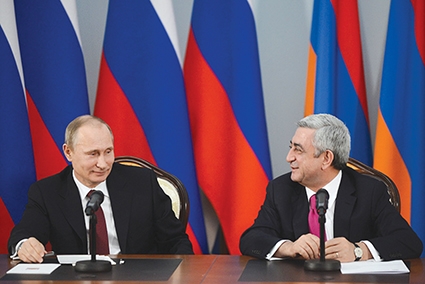Armenia’s Difficult Position
Op-Ed
On November 8, the Yelk Coalition, a pro-Western group in Armenia's parliament, submitted a proposal for the country to leave the Eurasian Union. This spurred public debate about the Eurasian Union's strengths and weaknesses even as abandoning the Russia-led union remains unlikely.
Nothing substantial came out of this proposition. It could have been a clever strategy on the government’s part to show to Moscow that not everything goes well with Russia’s closest ally in the South Caucasus, or simply a parliamentary motion. In both cases, it nevertheless sparked some sort of debate in international analytical circles.
The growth of anti-Russian sentiment has been present in the country for the last several years. Armenians are worried that their military and economic over-dependence on Russia makes their strategic position vulnerable. Now and then, we encounter news from the Armenian defense ministry stating that Yerevan wants to establish deeper military ties with other major regional countries such as Iran. There were even statements about Armenia planning to increase gas supplies from Iran.
Still, these initiatives are dwarfed by the real power Russia holds within Armenia: its control over Armenia’s vital infrastructure and the role Russia plays in the Nagorno-Karabakh conflict.
Moscow’s indirect involvement in the conflict falls neatly within the Russian overall strategy of fostering and managing separatist conflicts across the Soviet Union. The Russia-influenced separatist “statelets” of Abkhazia, South Ossetia and Transnistria have remained a cornerstone of the Kremlin’s foreign policy against the western military and economic encroachment. From Moscow’s perspective, Moldova, Georgia and Ukraine’s pro-western aspirations would be stopped, if not permanently then at least significantly hampered, if these conflicts continue to exist.
Although Moscow does not have its troops in Nagorno-Karabakh, it does have a military base, the 201st, in Armenia. Moreover, Russia’s influence in Armenia has increased over the past decade or so when the Kremlin-backed businessmen and companies such as Gazprom and others bought up vital electricity, communication and gas infrastructure in Armenia. Yerevan has also joined Moscow-led integration projects such as the Eurasian Union and Collective Security Treaty Organization (CSTO). Russia is also supporting Yerevan militarily through providing separate multi-million loans to buy Russian military hardware.
Thus, Armenia’s overall dependence on Russia’s economic and military potential gives the Kremlin the ability not only to navigate Yerevan’s foreign policy vector and keep it strictly within the Russian sphere of influence, but also to impact the Nagorno-Karabakh conflict.
Moscow also needs to be involved in the conflict as it fears Azerbaijan, with its rich energy resources and strong military capabilities, would be able to limit Russian influence on its foreign and internal political developments, while Azerbaijan-Georgia-Turkey cooperation would only grow. Losing any levers of influence to impact Azerbaijan’s foreign policy will be tantamount to the near collapse of Russia’s South Caucasus strategy, which includes not only denying Armenia, Azerbaijan and Georgia possibilities to join western integration projects, but also successfully limiting the export of rich deposits of oil and gas from the Caspian Sea through Georgian territory.
Any moves around the Nagorno-Karabakh conflict that may harm Russian interests will in turn strengthen Russia’s geopolitical contenders Turkey and Iran. Turkey could further solidify its cooperation with Azerbaijan (through Georgia, and I wrote on the positive sides of the Trilateral Format in the past), while Iran could potentially become more vocal about its broader interests in the South Caucasus.
For that reason, Moscow is increasing military hardware sales to both Armenia and Azerbaijan and thus trying to remain a major arbiter. For example, when in April 2016 a near full-scale war broke out in Nagorno-Karabakh, Russia was the power which stopped the fighting by brokering a ceasefire in Moscow between the Armenian and Azerbaijani military officials. Russia is also very careful not to let any of the competing sides gain ultimate military preponderance. It is true that statistically, Russia sells more armaments to Azerbaijan than to Armenia (and Yerevan is very much worried about that), but this deficiency is more to accentuate the Armenian weakness and the need to have Russia as its supporter. In other words, Armenia’s military dominance would negate any logic of needing Moscow as a military factor around the Nagorno-Karabakh conflict.
Armenia’s strategic position remains vulnerable and whatever the talks are regarding Armenia’s membership in Russia-led integration projects, Yerevan is unable to unilaterally change the course of its foreign policy: Russia simply has too many tools to strike back.
Emil Avdaliani teaches history and international relations at Tbilisi State University and Ilia State University. He has worked for various international consulting companies and currently publishes articles focused on military and political developments across the former Soviet space.
Emil Avdaliani












